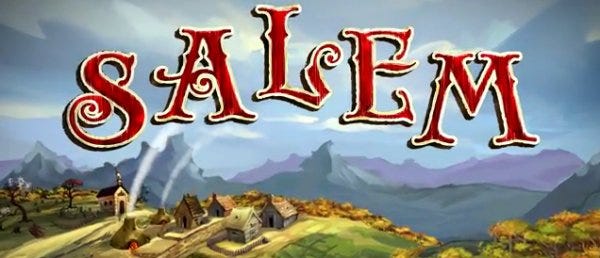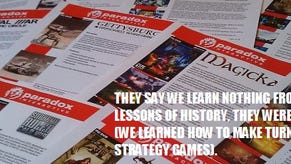The New World: Salem Explained
If you go down to the woods today
Salem is an intriguing little idea, a cutesy co-operative crafting MMO reminiscent of Wurm Online. Like many of Paradox's GamesCom announcements, it seemed to be at a very early stage of development, so we caught up with the Creative Director Bjorn Johannessen to find out more about it.
[Roving reporter Dan Griliopoulos started transcribing this one whilst staring at the waters of Lake Garda (hating himself for thinking 'nice pixel shaders') and finished it staring at a fried breakfast on the Holloway Road (thinking 'lovely reflections on those eggs'.)]
RPS: The game is obviously at an early stage, what with all the Platonic objects. What are all the chests?
Bjorn: The chests are... chests. They contain stuff, quite simply! We have some priestly robes, some clay, this hat is called “The Latest from Paris”. We can put it on, to see just how lovely it is...
RPS: Ha! That's very nice but... what is all this? (waves vaguely at game, which is displaying a simple village centre at an extremely early stage of development.)
Bjorn: This is our basic take on a starting area. Everything we see around us would be created by the players, apart from the natural objects. So the church, the chests, the stone paths... the rest is obviously randomly generated at game-start.
RPS: So it’s halfway to Wurm Online then?
Bjorn: Yeah, it's a similar premise. Players obviously take the roles of colonists from the Old World setting out to the New World, around the time of the 13 colonies, sometime between 1500 and 1700, on the American eastern seaboard and New England. Basically the game is a huge sandbox life simulator type thing. Obviously that includes that every object which you see around you can be affected one way or another, like these trees can be chopped down. As you see, chopping down a tree is a lengthy process that takes a long time. Obviously, it's an MMO, so we want to build in MMOish aspects, so here, for example, two players can co-operate on chopping down the same tree.

RPS: Um, behind that tree – I don't remember the New World containing Pegasi?
Bjorn: (Laughs) That would be the infamous Jersey Devil. That's one of the creature types. Our bestiary is heavily inspired by several sources; HP Lovecraft being one, Alice in Wonderland another, lots of March Hares and stuff like that, Tim Burton. One source we've really drawn from is a book called Fearsome Creatures of the Lumberwoods (Which looks like an amazing book – Ed). It's a pretty small book, but it's basically a collection of Lumberjack folklore from Northern Maine. It contains a whole slew of crazy and unusual creatures like, uh, we have the Jersey Devil of course, and a Hide-Behind, which I can just spawn (a lurching, creeping bipedal monstrosity with big eyes appears). The Hide-Behind is famous for always trying to hide behind the object that it stalks, so eventually when we get creature AI in, it's going to be tracking players.
RPS: Isn't going to be obvious in daylight?
Bjorn: Here we have a full daylight scene and the idea we have is that, as players develop an area, we're going to have a civilizing of the area that will partly determine the brightness of the area. The farther away you get from civilized territory, the darker and more foreboding the woods are going to become. Also, like, the further out you get the stranger the creatures are going to get. In a full daylight area, you're going to see funny bunnies,deer and bears; further out, the Hide-Behinds and Squonks and Gumberoos and what have you...

RPS: It’s odd, because the name Salem evokes Witchcraft, but this is halfway to the Sims. Where are the witches?
Bjorn: We have a system for crime and punishment; I don't really know where to start, so I'll start here. (He points to the top of the screen, where a curious four-way divided diagram seems to be filled in different ways.) Up here, we have the four cardinal body fluids of the character.
RPS: You mean, the humours? (A hilarious discredited medical science)
Bjorn: Exactly. What we have is blood, phlegm, yellow bile and black bile, and these are the four primary characters values that you have.
RPS: So your character can be choleric, in the classic sense?
Bjorn: Which was choler? When you have a deficiency of yellow bile? You never really know with this pseudo-science. We use it in a more straight-up fashion. Blood is basically a health meter, phlegm is a stamina-type meter, when you chop down a tree for example, yellow bile is for combat and throwing punches, defensive stances, and black bile is used to acquire skills. Basically, we have a whole slew of little skills down here in the study screen. They're pretty self-explanatory, like agriculture, baking, carpentry, coffer-making, masonry, hide-working, etcetera.
RPS: Coffer-making?
Bjorn: You make coffers.
RPS: The chests?
Bjorn: Yeah. We illustrate the skills with a name and a little quote from relevant literature and description. The skills, basically determine, what you can do; what forage-ables can you see, can you climb a mountain or not, can you ride a horse, can you build a windmill, etc. So basically players need to expend black bile to learn skills. If a player reaches zero in any of these dimensions, he's going to be knocked out. (His programmer Frederick kindly beats him unconscious to demonstrate). I'm out cold. He laughs at me. I can't interact with my inventory at all, and if Frederick just leaves me like this, I will wake up again. If he hits me again now, I die. And death in Salem is permanent, meaning my character is gone, and all his skills are gone.
RPS: That's not very nice.
Bjorn: Not at all. But it leads me to the point I was after; when Frederick knocks me out, he's committed a crime. Whenever a player commits a crime, he leaves a little scent behind, called the Stench of Crime, a kind of clue. Those clues (bobbing exclamation marks) can be used to track the crime; I get up this little window here, where I can choose to track the perpetrator, the claim of the perpetrator (his homestead basically), or the item that was stolen. If I were to track the perpetrator the arrow would obviously point mysteriously... in the direction of Frederick. And if the crime is serious enough – murder, theft or vandalism – I can also use this clue to summon Frederick's character into the game, if he is offline.
RPS: Does that mean he could log back in to find out his character's been jailed or executed?
Bjorn: Exactly. This is why people want to think twice before they start going on a rampant killing spree because a) you can only do that if you have a developed character; you need to have skills to be allowed to kill people and b) when you do that you expose said developed character to the risk of retaliatory damage. Because any random idiot walking through here could find the clue and track him, just for the hell of it.
RPS: Can you train someone up to be a town Sheriff?
Bjorn: Definitely. If you learn, for example, Indian Tracking, you have a easier time tracking other players. We're going to have a bunch of skills like that, to allow players to specialise in niches, and making it harder for others to use; sneaking and that. The point that I was actually going to come to was that Witchcraft is one crime type; we haven't got it in yet, because we've had trouble formulating the exact mechanic for it, but when we do get it in Witchcraft is going to be a form of criminality, which leave clues behind that players can use to track.
RPS: So what would Witchcraft be? Healing myself at the expense of someone else?
Bjorn: Exactly; you'd hurt someone else to gain a better fit for yourself. Many of the traditional European concepts of Witchcraft included things like 'making your neighbour's cow milk blood so that your cow milks more milk”.

RPS: What about the concept of feuds? Frederick’s just beaten you up, but you don't have the fighting skills to take him on, but you bewitch him? What would the player body do? Execute both of you?
Bjorn: It's very much up to the players; this is based on an indie game we released ourselves called Haven and Hearth, it has a lot of similar mechanics. What we see there is that villages have very personal conceptions of justice, in terms of what they tolerate and not tolerate. Some are goody two-shoes villages that seek to maintain law and order around them; others are griefing communities, basically, out to dominate the world and cause havoc. There's again always a balance of terror going on. At the high-end of it, the game can become intensely political, with the villages and factions fighting against each other for control of resources.
RPS: The neutral or non-violent villages would have a massive disadvantage against the violent ones? If you track down a member of another village, can you do anything to him?
Bjorn: Yeah, of course. You can do anything to him. There's no such thing as a non-violent village. If they have a village, they have people in it who can fight, it's more of an attitude question; do they fight randomly, do they grief, do they attack unprovoked?
RPS: The idea of a government is something given a monopoly of violence, after all.
Bjorn: Yeah, so players can form their own little governments; the reason we chose this setting is that many of the early colonies have their own laws, charters and so on. The villages take the place of clans or guilds in other games. You can't choose to opt out of the crime system, but your village can assist you. That happens a lot in haven, where a village has crime have as a form of lifestyle, so allow their members to pillage, as long as they don't do it to their fellow travellers.
RPS: When do you think it will be finished?
Bjorn: We're going to roll out the closed alpha pretty soon and the beta out beginning of next year, for the final release in the summer of 2012.
RPS: Thanks for your time.




